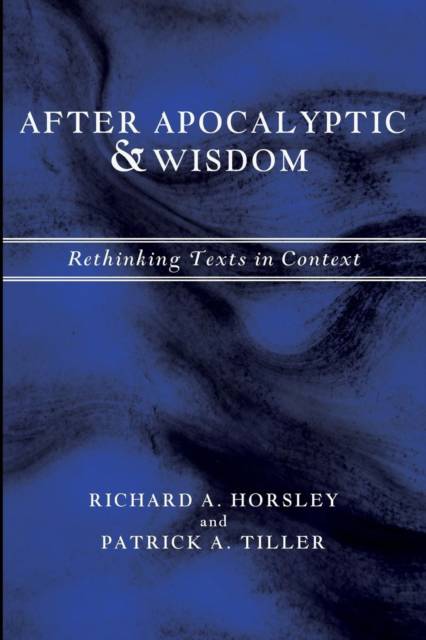
- Afhalen na 1 uur in een winkel met voorraad
- Gratis thuislevering in België vanaf € 30
- Ruim aanbod met 7 miljoen producten
- Afhalen na 1 uur in een winkel met voorraad
- Gratis thuislevering in België vanaf € 30
- Ruim aanbod met 7 miljoen producten
Zoeken
After Apocalyptic and Wisdom
Rethinking Texts in Context
Richard A Horsley, Patrick A Tiller
Paperback | Engels
€ 58,45
+ 116 punten
Uitvoering
Omschrijving
CONTENTS Introduction PART ONE: The Social-Political Context of Apocalyptic and Wisdom Texts 1. Ben Sira and the Sociology of the Second Temple 2. The Politics of Cultural Production 3. The Social Settings of the Components of 1 Enoch PART TWO: Reconsiderations of Texts in Historical Contexts 4. Israel at the Mercy of Demonic Powers: An Enochic Interpretation of Imperialism 5. Social Relations and Social Conflict in the Epistle of Enoch 6. Fourth Ezra: Anti-Apocalyptic Apocalypse 7. Late Twentieth-Century Scribes' Study of Late Second Temple Scribes PART THREE: Questioning the Categories as Applied to the Gospels and James 8. Questions about Wisdom and Apocalypticism 9. Sayings of the Sages or Speeches of the Prophets? Reflections on the Genre of Q 10. Apocalypticism and Wisdom: Missing in Mark 11. Apocalypticism in the Gospels? The Kingdom of God and the Renewal of Israel 12. The Rich and Poor in James: An Apocalyptic Ethic
Specificaties
Betrokkenen
- Auteur(s):
- Uitgeverij:
Inhoud
- Aantal bladzijden:
- 342
- Taal:
- Engels
Eigenschappen
- Productcode (EAN):
- 9781610972857
- Verschijningsdatum:
- 24/10/2012
- Uitvoering:
- Paperback
- Formaat:
- Trade paperback (VS)
- Afmetingen:
- 152 mm x 226 mm
- Gewicht:
- 476 g

Alleen bij Standaard Boekhandel
+ 116 punten op je klantenkaart van Standaard Boekhandel
Beoordelingen
We publiceren alleen reviews die voldoen aan de voorwaarden voor reviews. Bekijk onze voorwaarden voor reviews.











